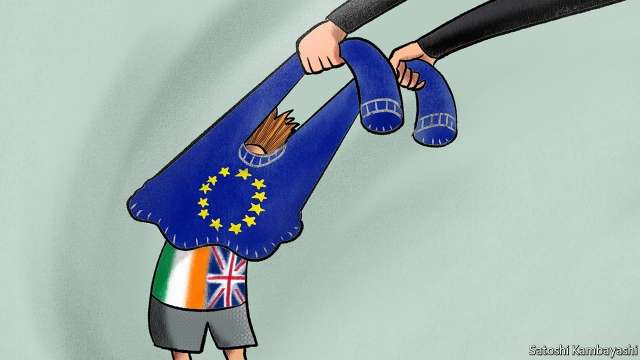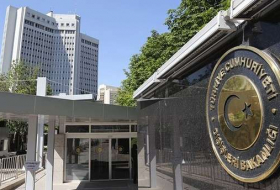Twenty years ago that awful conflict was ended by the Good Friday Agreement. As Britain and Ireland each softened their claim to the province, Protestants and Catholics agreed to share power in Stormont. The centuries-old question of to whom Northern Ireland belonged was carefully buried for future generations to unearth when they were ready.
Now Britain’s impending exit from the European Union, foreseen by nobody in 1998, has posed the question again, long before Northern Ireland has an answer. Britain’s ruling Conservatives treat this as, at best, a detail and, at worst, an irritation on the road to Brexit. That is an error—possibly a fatal one.
After two decades of peace, Northern Ireland is at once transformed and unchanged (see Briefing). Violence has dried up to the point where the crime rate is lower than the British average. Hotspots where armoured cars used to rumble now receive convoys of tourists. Yet beneath the bandage of the Good Friday Agreement, the healing has been slow. Protestants and Catholics still lead segregated lives. Just 5.8% of children are in formally integrated primary schools. Stormont is gridlocked and has been suspended for over a year.
In London some say that this shows the Good Friday deal has failed. That is to misunderstand its purpose. Peace agreements stop conflicts; reconciliation and integration are generational tasks. Chivvied along by the British and Irish governments, Northern Ireland’s parties had until recently kept faith. Society is changing too slowly, but it is inching forward.
Brexit now threatens this. Britain and Ireland are too distracted to give enough attention to Belfast, which looks like the child in an acrimonious divorce. Britain squandered its standing as a neutral referee when the Conservatives formed a governing alliance with Northern Ireland’s main unionist party and the Labour opposition voted in a vocal republican as its leader. The Irish government has aggravated tensions by reviving talk of unification, something it previously tiptoed around. Both prime ministers must now go out of their way to show they are committed to getting Stormont up and running.
Above all, Brexit has revived nagging questions of identity. The Good Friday Agreement and both countries’ membership of the EU allowed people to forget about whether they felt Irish or British. Their option of dual citizenship, the invisible border and growing north-south co-operation, on everything from electricity markets to health care, blunted the distinction. Brexit sharpens it again.
This is clearest at the border. Britain says it will leave the EU’s single market and customs union, and that new technology will let it do this without any new infrastructure or inspections at the Irish frontier. The EU (and plenty of others) doubt that this is possible. The EU argues that such technology does not yet exist and says that if Britain cannot come up with a more convincing plan, Northern Ireland must maintain customs and regulatory alignment with the EU. In effect, that would create a border between it and Britain.
A farewell to arms
For The Economist, this is not much of a conundrum. We have long argued that Britain would be better off staying in the customs union and single market; that this also keeps Ireland’s border invisible only adds to the case. Polls suggest that most voters agree. But the government believes that anything less than a hard Brexit would betray the referendum.
Some Brexiteers dismiss the border question as a ploy by Ireland and “Remoaners” to wheedle a soft Brexit. They are being superficial and reckless. Northern Ireland’s Catholics are deeply unsettled by Brexit, which undermines assumptions on which the Good Friday Agreement was made. Protestants are jumpier still. In recent decades they have lost their grip on government, business and the public sector; they will soon be outnumbered. Erecting barriers between either community and the place each considers its home would cause anguish.
Again, Brexiteers play this down, arguing that a border like Canada’s with America would be easy enough to cross, and that trade between Northern Ireland and the south is small. Some have even said Ireland should leave the EU and join a single market with Britain, so strong are the commercial links.
To understand why this misses the point, they should examine their own triumph in 2016. They won the Brexit referendum because arguments about culture and identity trumped those about economics. Some of the MPs telling the Irish to calm down about the prospect of a few cameras and customs officers are outraged at the news that British passports are set to be made by a French company. Brexit suggests that, when people feel that remote elites are trampling on their culture and threatening their identity, they react unpredictably. Northern Ireland is a dangerous place to put that theory to the test.
This article appeared in the Leaders section of the print edition under the headline "Identity theft" of the Economist.
More about: Brexit















































